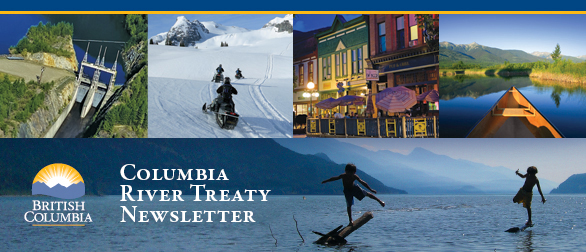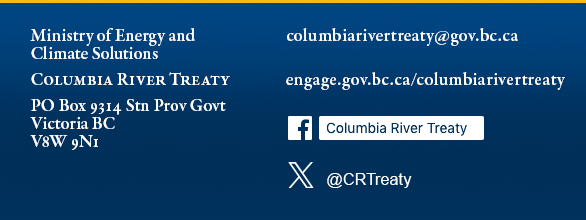Columbia River Treaty
Edition: September 2019

Agreement to Collaborate on Salmon Re-Introduction
Sep 5, 2019
The Columbia River sparkled under a sunny sky on July 29, 2019, as representatives from Indigenous Nations, federal and provincial governments, and community residents gathered in Millennium Park in Castlegar for the signing of a historic letter of agreement.
Under the agreement, the Ktunaxa, Secwepemc, and Syilx Okanagan Nations and the Canadian and B.C. governments have committed to work together to explore options for the re-introduction of anadromous salmon into the Upper Columbia River Basin.
Historically, large numbers of salmon moved up the Columbia River to the headwaters at Columbia Lake. But construction of the Grand Coulee Dam between 1933 and 1942 cut off salmon migration up the Columbia. Additional hydro dam development in Washington and B.C. in subsequent years created further fish barriers and altered river flows.
The loss of the salmon was devastating to Indigenous peoples who relied heavily on Columbia River salmon for food and for social and ceremonial needs.
“This was the essence of our culture and life that kept us healthy not only physically but was the bond of our communities,” said Chief Barb Cote of the Shuswap Indian Band.
Indigenous Nations have been working for decades to restore salmon runs on the Columbia and hailed the agreement as a monumental step forward.
“I am thrilled that the five governments that need to work together are doing just that: committing to work collaboratively to see what we need to do together to bring the salmon back,” said Kathryn Teneese, who signed the letter of agreement as chair of the Ktunaxa Nation Council.
Representing the Syilx Okanagan Nation, Chief Chad Eneas of the Penticton Indian Band said that “ntityix (Chief Salmon) is one of our Four Food Chiefs, and a central part of securing Syilx food sovereignty. Moving forward we are dedicated that these efforts not just use the best, cutting edge science, but also align with Syilx Okanagan traditional knowledge, cultural beliefs and practices for successful return of salmon, protection of our waters and health of the planet.”
Doug Donaldson, Minister of Forests, Lands, Natural Resource Operations and Rural Development, signed the agreement on behalf of the Province, noting that the “Syilx Okanagan, the Ktunaxa, and the Secwepemc peoples have resided on the banks of the Columbia River for generations. And including your traditional knowledge and expertise is essential to any efforts to reintroduce salmon into this area.”
The Columbia Basin Trust was instrumental in bringing all parties together to collaborate on the successful development of the agreement.
The five governments and the Columbia Basin Trust have together committed $2.25 million to explore a range of issues associated with the re-introduction of salmon into the Upper Columbia, including what species of salmon would be introduced where, the impacts to the biodiversity and fish species that are currently present, and impacts to water levels, hydro production and flood protection.
The work will complement the current negotiation process between Canada and the United States to modernize the Columbia River Treaty.
Katrine Conroy, MLA for Kootenay West and Minister responsible for the Columbia Basin Trust, Columbia Power Corporation and the Columbia River Treaty, and Michelle Mungall, MLA for Nelson-Creston and Minister of Energy, Mines and Petroleum Resources, attended the signing ceremony.
Minister Conroy spoke about the importance of restoring salmon to the Upper Columbia as part of “addressing ecosystems in a modernized Treaty”, adding that the agreement “aligns with the B.C. government’s commitment to the United Nations Declaration on the Rights of Indigenous Peoples and our journey towards reconciliation.”
Pamela Goldsmith-Jones, parliamentary secretary for Global Affairs Canada, represented the Government of Canada at the event, signing the letter of agreement on behalf of the Minister of Fisheries and Oceans, Jonathan Wilkinson.


